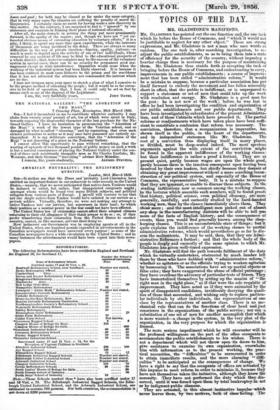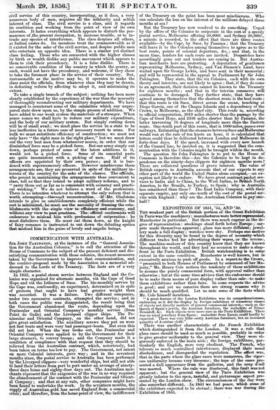TOPICS OF THE DAY.
MR. GLADSTONE'S MANIFESTO.
MR. GLADEPTONE has pointed out the one function and the one task which lie before the House of Commons, and " which. it wouldnot be justifiable to neglect for any other object." These are strong expressions, and Mr. Gladstone is not a man _who uses words at random. The one task is, after searching investigation, to re- adjust the publie establishments, so as to bring them into a state of efficiency for the security of the country, without imposing a heavier charge than is necessary for the purpose of maintaining them. Mr. Gladstone thus stands forth as accepting the task of bringing before the House of Commons, and endeavouring to carry, improvements in our public establishments ; a course of improve- ment that has been called " administrative reform." It would be a mistake to suppose, because a particular association has put - itself forward to embody the movement and has fallen miserably short in effect, that the public is indifferent, or is unprepared to support a statesman or set of men that could -take up the work with resolution and energy. Mr. Gladstone is a good man for the post : he is not new at the work ; before he was last in office he had been investigating the condition and organization of our public establishments and our public departments. They have been investigated by subordinates of the present Administra- tion, and of those Cabinets which have preceded it. The partial reforms or readjustments which have taken place have been suffi- cient to constitute a confession that reform was necessary. The oonvietion, therefore, that a reorganization is imperative, has shown itself in the public, in the heart of the departments, and in independent statesmen like 'Mr. Gladstone. The root of a conviction thus displaying itself in many places, an divided, must be deep-seated indeed. The most specious arguments against the wide extent of the conviction might be found in the apparent indifference of the working classes : but their indifference is rather a proof i'fortiori. They are at present quiet, partly because wages are upon the whole good, partly because there is the inaction consequent upon having been deceived by their own leaders, but chiefly because they despair of obtaining any great improvement without a more searching recon- struction of our political system, and especially of the House of Commons, the representative body. It is a mistake to suppose that they are ignorant, or 'linable to discuss these subjects. In the institutions. now so common among the working classes, rtielectures which assemble such numbers, wjll be found proofs `that history, political science, even political eaonomy, are more generally, carefully, and earnestly studied by the hard-handed working men, than by the classes immediately above them. They think more ; and the most intelligent- men picked out of almea any shop in the-mannfacturing districts will be able 'to tell yen more of the facts of English history, and the consequences of events, than you would ford generally known among the shop- -keeping classes-. This is an uncomfortable' state of things ; but it quite explains the indifference of the working classes to partial administrative reforms, which would nevertheless go so far to dis- arm:the malcontents. It' may be said, then, that they are Admi- nistrative Reformers a fortiori ; and that the whole body of the people is deeply and earnestly of the same opinion to which Mr. Gladstone has given well-timed expression. Mr. Gladstone will find the path towards fulfilment of the duty which he virtually undertakes, obstructed by much lumber left there by those who have dabbled with " administrative reform," whether as agitators or as the officials trying to weaken agitation by humouring it. The associations have set up partial objects or false cries ; they have exaggerated the abuse of official patronage ; they have overdone the advocacy of particulart,ests of fitness. They have immortalized themselves by setting up the maxim of " the right man in the right place," as if that were the sole requisite of improvement. They have acted as if they were animated by the spirit of disappointed candidates, invidiously decrying the quali- ties of those that succeeded, and wishing only to replace particu- lar individuals by other individuals, the representatives of one class by the representatives of another class. There is no me- chanical rule that can do the functions of clear head and just conscience in the organizations of the publie service ; nor can a substitution of one set of men for another accomplish that which is more wanted—a change in the system, in the very plan of the organization, in the very purpose for which the organization is framed.
The more serious impediment which he will encounter will be
the professed willingness on the part of the office occupants to accommodate the public establishments to his wishes. There is not a department which will not throw open its doors to him, give assistance to examine its own organization, overwhelm him with information as to the present working, the prac- tical necessities, the " difficulties" to be surmounted in order to attain immediate results, and the more alarming " diffi- culties " to be anticipated as the consequences of change. We have a right to say that the occupants of offices are actuated by this impulse to meet reform in order to minimize it, because they have not themselves taken the initiative, although they knew the necessity. They have not performed the duty which they dis- cerned, until it was forced upon them by total bankruptcy in act or by indignant public clamour.
They are actuated, in this almost instinctive impulse which never leaves them, by two motives, both of class feeling. The
civil service of this country, incorporating, as it does, a very numerous body of • men, acquires all the solidarity and selfish interest of class. The civil service is a class, and it regards its condition and workingfrom the point of view of its own interests. It hates everything which appears to disturb the per- manence of the present occupation, to increase trouble, or to in- trude any species of interference. The class despises all others, as Indian castes do. Its members treat the commonwealth as if it existed for the sake of the civil service, and despise public men who entertain an opposite idea. There is a similar yet distinct class feeling. Those who are connected with the higher classes by birth or wealth dislike any public movement which appears to them to risk their precedency. It is a false dislike. There is no conceivable condition of the country in which the gentry, as such, would not have the precedency, and welcome, if they chose to take the foremost place in the service of their country. But, unreasonable as the motive may be, it operates to make the class assist the officials, from whatever class they may be drawn, in defeating reform by affecting to adopt it, and minimizing its extent.
To take a single branch of the subject: nothing has been more clearly established by the experience of the war than the necessity of thoroughly reconstructing our military departments. We have managed to counteract some of the calamities which our unpre- pared state drew upon us, by the simple process of addition. We have added to our weak system the materials of a stronger. When peace comes we shall have to reduce our military expenditure, and the body of our military system. But simply cutting down
will be of small avail ; we must- the the service in a state to be less ineffective in a future case of necessary resort to arms. For balk we must substitute efficiency of construction; we must not only have " the right man in the right place," but we must draw out the very best men from whatsoever source, in order that our diminished force may be a picked force. But our army simply cut down, perhaps pruned of some of the latest additions to it, would not be a picked force. Some of its essential parts are quite inconsistent with a picking of men. Half of its officers are appointed by their own purses.; and it is bur- dened with supernumerary officers. However mischievous these arrangements are, they are preserved in spite of the military in- terests of the country for the sake of the -classes: The officials, who persist in maintaining the arrangements thus convenient to class, tell us that they intend to adopt military-reforms; and to " carry them out as far as is consistent with economy and practi- cal working." We do not believe a word of the professions.. There is no intention whatever to attempt the only reform that is worth attempting—thorough reconstruction. If_ Mr,. Gladstone intends to give us establishments completely efficient while the cost is minimized, he must see the necessity of framing the esta- blishments with the single view to efficiency and economy, and without any view to past practices. The official conformists will endeavour to mislead him with professions of cooperation ; he must disbelieve them. He- must cut them down, as the knight of fairy romance is instructed to cut down the deluding sprites that mislead him in the guise of lovely and angelic beings.



























 Previous page
Previous page